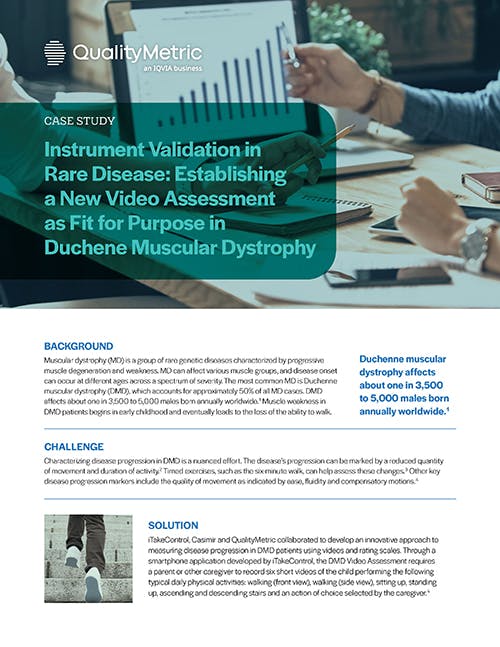Muscular dystrophy (MD) is a group of rare genetic diseases characterized by progressive muscle degeneration and weakness. Characterizing disease progression in the most common form of MD, Duchenne muscular dystrophy (DMD), is a nuanced effort. To evaluate treatment efficacy in DMD clinical trials, QualityMetric adapted typical cognitive debriefing methods to measure disease progression in DMD children using videos and rating scales. In a free case study, learn more about the DMD Video Assessment and its ability to support high-quality, reliable and consistent assessments of patients with DMD.
Please answer the following questions and we will be in touch regarding your license
QualityMetric is reviewing your application and will get back to you shortly with approval to move forward with a license to administer, collect, score, and interpret the data for your project/study.
Next steps:
If you have started administering the survey, please email a copy of the survey being administered to [email protected]. We will QA the form for any changes that may affect the scoring and interpretation of the data collected. (Fees may apply).
If you are applying for a student license, please email a copy of your student ID to [email protected].
Muscular dystrophy (MD) is a group of rare genetic diseases characterized by progressive muscle degeneration and weakness. Characterizing disease progression in the most common form of MD, Duchenne muscular dystrophy (DMD), is a nuanced effort. To evaluate treatment efficacy in DMD clinical trials, QualityMetric adapted typical cognitive debriefing methods to measure disease progression in DMD children using videos and rating scales. In a free case study, learn more about the DMD Video Assessment and its ability to support high-quality, reliable and consistent assessments of patients with DMD.

THIS CASE STUDY WILL DISCUSS:
A novel approach to measuring disease progression in DMD, the DMD Video Assessment requires a parent or caregiver to record six short videos of children performing typical daily physical activities. This case study discusses several aspects of the performance-based assessment, including the relevance of activities measured, the feasibility of the procedures involved and the usability of the accompanying smartphone app.